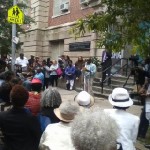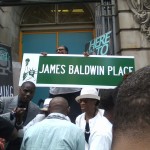When I first came to New York City, Harlem seems a forbidding place, mostly because I lived downtown and going uptown even for 35 cents was a chore. Most of my community, artistic and otherwise lived below 14th Street, mostly on the East Side. But Harlem is where Black people lived, worked and in the mythology of NYC, made the Harlem Renaissance. But that was decades ago. And yet, artists friends took me up to the Studio Museum, which was housed in an old studio, upstairs on Fifth Avenue. Down the street was a seriously good Latin restaurant. The pawnshops and nail salons and cheap furniture stores that dotted 125th street looked like the pawnshops and nail salons and cheap furniture stores on 14th street. There really is something about cross roads.
James Baldwin grew up in East Harlem. Grew to hate it, left America, but then again, his family stayed near. He stayed near his family. In a very psychic way, he really never left Harlem. Paris, Turkey the world travels were ways to bring his issues to the larger world, but those issues came from a specific place in America. I am not sure of what he would make of 128th street where he went to school. The well-appointed townhouses and brownstones have been spruced up. The beautiful green house across the street has one of the most perfect paint jobs I’ve ever seen.
On his birthday, August 2 his family and the community that came out on an overcast Saturday afternoon to sing his praises and present a ceremony honoring the placement of a street sign on the street were glad for the cool breezes and the day’s calm. I got there just as Sonia Sanchez was chanting Baldwin’s name. At some point, she said that Baldwin did not receive awards for his work—but he did receive many grants, fellowships. He would not have survived w/out that support and recognition. I often think that we put too much on awards as if the National Book Award or a Pulitzer will assure your place in the culture. Like on the tip of your tongue, could you tell me who won the Pulitzer Prize for fiction in say 2000? Or 1995 or 1978? I could look these up, but is it Updike or Bellow or Morrison? I don’t know. I do know the work of these fine writers and I now know much more about Baldwin.
On his birthday, August 2 his family and the community that came out on an overcast Saturday afternoon to sing his praises and present a ceremony honoring the placement of a street sign on the street were glad for the cool breezes and the day’s calm. I got there just as Sonia Sanchez was chanting Baldwin’s name. At some point, she said that Baldwin did not receive awards for his work—but he did receive many grants, fellowships. He would not have survived w/out that support and recognition. I often think that we put too much on awards as if the National Book Award or a Pulitzer will assure your place in the culture. Like on the tip of your tongue, could you tell me who won the Pulitzer Prize for fiction in say 2000? Or 1995 or 1978? I could look these up, but is it Updike or Bellow or Morrison? I don’t know. I do know the work of these fine writers and I now know much more about Baldwin.
As Rich Blint pointed out the street sign will not be put up for a while the city puts up all new signs on one day. (as if by magic) so they provide mockups that can be shown to the adoring populace. So on Saturday, the mockup was held up for all of us to see. It is green. Baldwin’s name is correctly spelled. His nephew Trevor Baldwin spoke eloquently for the family in accepting this honor. And representatives from the National Black Theater, from the school where this event took place and where Baldwin went to school were happy and proud. Black people mostly who know the family, knew “Jimmy” care about art and culture and Black history and Black people’s lives and this slice of Harlem and its volatile history were there. And then I got it, Harlem really is a small town. One where people do know each other, look out for each other, worry about each other. And who see the town slowly change as newcomers with more money come in; people who may not understand how hard won the beauty of these blocks from 125th and up was fought for against red lining, racism, neglect and countless deaths from bad drugs, bad decisions, poor diet or a life spent working 2-3 jobs so that children only had to get one. Baldwin understood that. His love is often cited, his ability to not the need for that. And I think like St. Paul who in First Corinthians 13 says “For now we see through a glass darkly”—that darkness must be acknowledged. It seems to me that all of this “transparency” and “illumination” that everyone talks about covers up more than darkness does. There is not light at the end of a tunnel of light, there is blindness.
Baldwin understand like St. Paul that “the greatest of these is charity”, but he could also say that you can only love after you recognize the rage resulting from injustice, brutality, hatred. He aspired to and achieved greatness as a writer, thinker, human being. We can only hope that generations hence seeing the street sign will think, I need to find out who this James Baldwin is. I hope that there will be many books, articles, oral histories, etc. along with his essential work available to those future readers.


